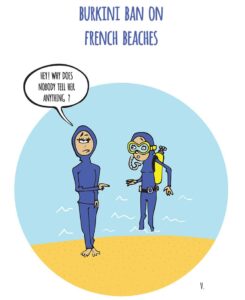With the rise of countries banning face veils, it comes as a relief to me that England has not succumbed to such a controversial method. In one of their recent council meetings, the prime minister of England, Theresa May, stated that Britain won’t be joining other European countries on the issue of face veils or any other expression of religion. She ruled that “what a woman wears is a woman’s choice.” Kudos to Theresa May.
That said, my Muslim sisters and I hope this never become a topic of discussion in the U.S. I don’t know of a rule more suppressing, ridiculous, and contradictory to values of American liberty than this one.
The idea of banning the niqab or the burkini (a modest swimsuit) is currently being challenged by those who remember the iconic photograph of Betty Fringle having her bathing-suit length measured on Palm Beach in 1925.
This image is reminiscent of last year’s controversy when France made huge headlines when photographs of a French mother in burkini, surrounded by guards, was forced to take her top shirt off. This was done in front of all the beach-goers and her children! What a humiliating experience! Although, the court in France later overruled this no-burkini law amidst the protests that rose up soon after this event, the damage was done. Both events have the fashion police haranguing women for similar reasons–their clothing. The only difference is that with one woman, the government found problem with her not being covered enough and with the other, they found fault her in being ‘too’ covered.
Why is that in countries where liberty is highly valued the government feels it can intervene in the debate over what women wear? It doesn’t make sense.
With specific regard to the burkini, these laws definitely don’t make sense; the burkini is quite similar to a wetsuit. And yet, I don’t see anyone getting riled up over wetsuits. This clearly indicates a bias in such laws which seem to suppress Muslim religious expression while masking as cries for protecting freedom. The concept of liberty has been central in both French and American history, as well as for other Western nations. but it is important to realize that this concept has been misused and exploited many times under different guises and the #burkiniban is one such example.

Image taken from A La Loupe
To fight this hypocrisy, I think both women and men should stand up to face veil and burkini bans. And even if men don’t, women should definitely stand up for other women. I mean we women are all in this together! I believe we should support one another whether it’s about lessening or increasing the amount of clothes one wears. It’s essential for women to be a source of comfort and support for each other because if not us, then who? And why would we then expect men to support us if we, ourselves, are divided? We also have to be role models for younger girls who are growing in a climate that is toxic sometimes on many levels so being accepting towards each other is critical.
Several years ago, I came across a thought-provoking cartoon that I happened to see again while writing this post. Here it is:

Image taken from The iPinions Journal
Obviously, the cartoon is not representative of what all women think but I think it’s definitely thought-provoking. We tend not to consider both sides of an issue, but rather focus on only the one or the other. This cartoon sums up the way we tend to critique others without recognizing our own hypocrisies.
Islam greatly emphasizes the respect of oneself and others no matter who they are. It preaches Muslims to be open to new ideas and to question. Personally, I have questioned a lot when I came across the images I discussed in this post. Lastly, I hope the U.S. will never impose a ban like France has, because these bans don’t protect freedom, they impede it.



whoah this weblog is great i like studying your articles.
Keep up the good work! You know, many individuals are hunting around for this
information, you can help them greatly.
Thank You so much! I really appreciate your input. 🙂 Please share my blog with others as well.